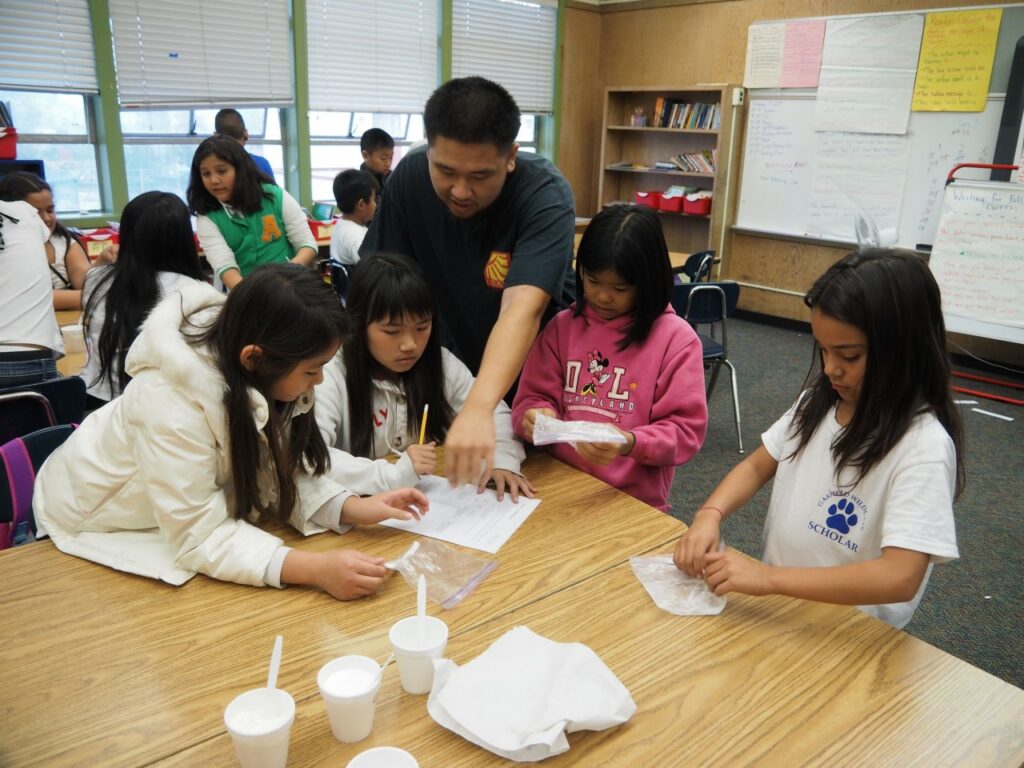Report urges sustained teacher training to improve science education
 Liv Ames for EdSource
Liv Ames for EdSource
 Liv Ames for EdSource
Liv Ames for EdSource
Many teachers are not well-prepared to teach the new Next Generation Scientific discipline Standards, according to new report released Tuesday.
Called "Science Teachers' Learning: Enhancing Opportunities, Creating Supportive Contexts," the report from the National Academies of Sciences, Technology, and Medicine makes several recommendations to help educators transition to the standards, which emphasize deeper learning of broad scientific concepts instead of memorizing facts and stress the relationship between what is taught in the classroom and workplace practices of scientists and engineers.
California adopted the Next Generation Science Standards in 2013. They are expected to be fully implemented past 2018.
"An evolving understanding of how best to teach science, including the NGSS, represents a significant transition in the way science is currently taught in most classrooms and volition require nearly scientific discipline teachers to alter the way they teach," the report concluded.
For the new science standards to make a difference in classrooms, teachers need training sessions that are more comprehensive than ane or 2 days of professional development, the study said.
"The Next Generation Science Standards are a motivating cistron for us to think differently about learning opportunities for both students and teachers," said Suzanne Wilson, a professor of teacher education at the Academy of Connecticut and chairwoman of the commission that conducted the study, in a prepared argument.
The Committee on Strengthening Science Education, through a Teacher Learning Continuum, worked for about two years on the report, reviewing a number of studies related to science education and teacher training. It included five members from California. Paula Hooper, a former senior science educator in the Institute for Inquiry at the Exploratorium in San Francisco, was one of them.
To really transform the way science is taught in California and around the country, teachers demand sustained professional person evolution throughout their careers, which Hooper called "professional learning." Although the state lath has not yet canonical a curriculum framework or instructional materials, Hooper said teachers should begin exploring new ways of instruction science now and share ideas together in professional learning communities. The standards, she said, encourage teachers to recollect nearly how science learning progresses from one form level to the next.
For example, she said kindergartners learn about animal habitats. When students reach fourth grade, they tin begin to brand connections between beast habitats and the surround.
"Kids acquire best when they are actively engaged in making sense of ideas," she said. "It means you accept to create environments where kids are playing with the phenomena themselves – whether you're dropping a parachute, or looking at a rainbow, or playing with a simulation on a computer. That'due south the kind of innovation I hope this report can really bring out in how people are thinking in California."
The report, funded past the Merck Foundation, establish that elementary teachers – specially those in low-income areas – lack the experience they need to make scientific discipline come alive for students. That is considering many teachers in such schools accept less feel than their peers in more affluent schools and low-income schools have higher teacher turnover.
The new science standards have been adopted in 16 states. Like the Common Core Land Standards in English language arts and mathematics, the new science standards stress college and career readiness skills, such as critical thinking, reasoning and trouble-solving.
Similarly, the study outlined key scientific ideas and skills for teachers that will enable them to effectively implement the standards.
"Closing the gap between the vision of pedagogy science exemplified in the NGSS and electric current teaching in many schools volition require creating a system of policies and practices that support private and collective teachers' needs, allowing them to deepen their own expertise, while challenging their students to learn, enjoy, and capeesh science," Wilson said.
The report urged districts to provide professional learning opportunities to teachers both inside and outside of schools, assuasive for collaboration and the development of instructor leaders or coaches. It likewise found that online programs and social networking could assistance teachers to connect around science themes and educational activity strategies.
Professional person learning tin be enhanced through partnerships with teachers and their professional person networks, higher education institutions, and cultural and community partners. For example, Hooper said the Exploratorium and Lawrence Hall of Science in the San Francisco Bay Area work with districts such as Oakland Unified to build teachers' hands-on training in inquiry-based learning.
"Understanding how to make sense of problems and ideas requires thinking about non just the bodily science knowledge, only also the skills that you need to take to process that noesis," Hooper said. "Students acquire by actually doing things and coming back with their own thoughts about why things happen."
Districts, the report said, should develop multi-year plans for professional learning linked to science goals for students.
"I think California districts are really ripe for the kinds of professional person learning this study advocates," Hooper said. "These are things that require teachers to become learning practitioners – to call up about what information technology means for children to larn science this style – then children will make sense out of science ideas."
To become more reports like this i, click here to sign up for EdSource's no-toll daily email on latest developments in educational activity.
Source: https://edsource.org/2016/report-urges-sustained-teacher-training-to-improve-science-education/93726
0 Response to "Report urges sustained teacher training to improve science education"
ارسال یک نظر